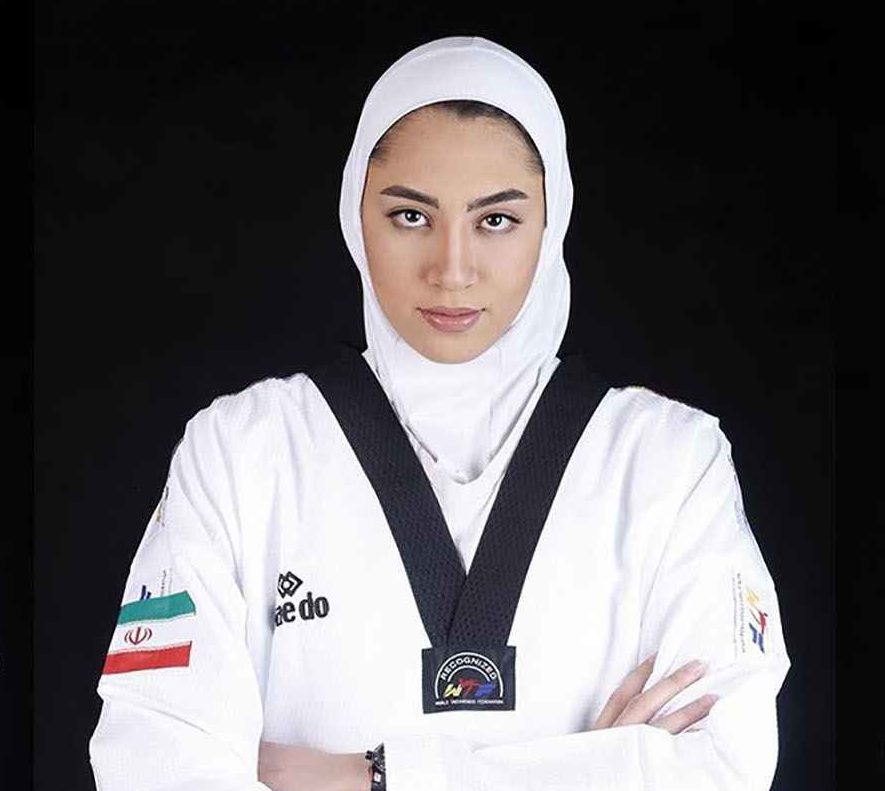February 07 2020

KImia Alizadeh, the only Iranian woman ever to win an Olympic medal, has become the third Iranian in international competition to defect in the last several weeks.
The previous two defectors—Saeed Mollai in judo and Alireza Firouzja in chess—both said they were leaving Iran because of its rule barring them from facing Israelis and thus forcing them to concede matches in competition.
And then a fourth person, a male taekwondo competitor, moved to Bulgaria, but said he was not defecting.
Alizadeh, 21, who also competes in taekwondo, did not cite the Israel rule, however. She spoke of the dress code and also said the Iranian officials who run taekwondo “exploited” her and other players.
She said she would not compete for Iran in this summer’s Olympics. The coach of the Dutch taekwondo team, Mimoun el Boujjafi, said Alizadeh had been training with the Dutch team since December 18. On January 20, he said she had moved to Germany.
Musa Cicek, vice president of the German Taekwondo Union, said there was no guarantee she could fight for Germany even if the naturalization paperwork could be done in time. The Olympics begin July 24. Alizadeh said she understood that and was prepared to wait until the 2024 Olympics.
Cicek also pointed out that many German women have been seeking spots on the German team for four years and there “won’t be a free ticket” for Alizadeh
In an Instagram post January 11 explaining why she was defecting, Alizadeh said, “I am one of the millions of oppressed women in Iran whom they have been playing with for years.”
Alizadeh became the first Iranian woman to win an Olympic medal after claiming bronze in the 57-kilo category of taekwondo at the 2016 Rio Olympics.
Affectionately known in Iran as “The Tsunami,” Alizadeh wrote, “They took me wherever they wanted. I wore whatever they said. Every sentence they ordered me to say, I repeated. Whenever they saw fit, they exploited me.
She complained that the credit for her success always went to those in charge.
“I wasn’t important to them. None of us mattered to them, we were tools,” Alizadeh wrote, explaining that while the regime celebrated her medals, it criticized the sport she had chosen, saying: “The virtue of a woman is not to stretch her legs!”
The head of Iran’s Taekwondo Federation, Moham-mad Pouladgar, claimed Ali-zadeh had assured both her father and her coach that she was traveling as part of her vacation, a trip he claimed was paid for by the Iranian government. Before her Instagram message, he dismissed the reports of her defection as politically motivated rumors amplified by the foreign media.
But then Alizadeh confirmed the rumors, saying she “didn’t want to sit at the table of hypocrisy, lies, injustice and flattery” and that she did not want to be complicit with the regime’s “corruption and lies.”
“My troubled spirit does not fit with your dirty economic ties and tight political lobbies. I wish for nothing else than for taekwondo, safety and for a happy and healthy life,” she said adding that she was not invited to go to Europe.
She said the decision to defect was harder than winning Olympic gold. “I remain a daughter of Iran wherever I am,” she said.
Meanwhile, a member of Iran’s male national taekwondo team, Farzad Zolqadri, 27, disclosed that he has been naturalized in Bulgaria and would represent his new country in world events.
A former captain of Iran’s junior taekwondo national team, Zolqadri will first fight for Bulgaria February 18 in an international tournament in Sweden.
Zolqadri’s defection astounded many since he is the son of an official in the Islamic Republic’s Taekwondo Federation. The father, Gholam-Reza Zolqadri, has been an outspoken critic of Iranian athletes defecting. But he has so far remained silent on his own son’s defection.
Dismissing asylum seekers as traitors, Zolqadri senior said four years ago, “Those who take refuge in other countries are after showing off, placing themselves at the center stage, pocketing foreigners’ money, and disowning their national flag.”
The younger Zolqadri, however, said he wasn’t defecting but merely seeking a better chance of making an Olympic team where the competition was as great as in Iran. That goes against the Olympic rules, which do not allow athelets to go shopping for a host country..






















